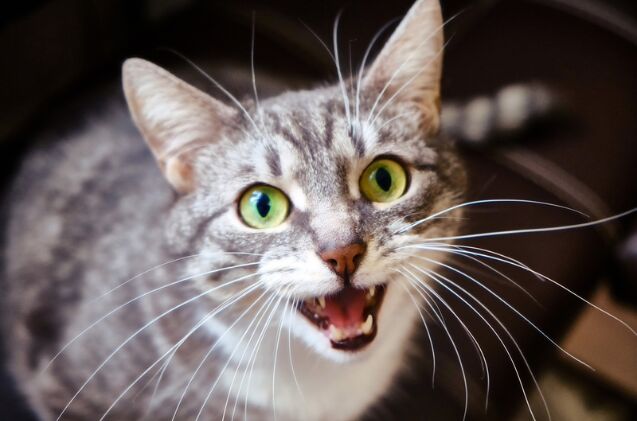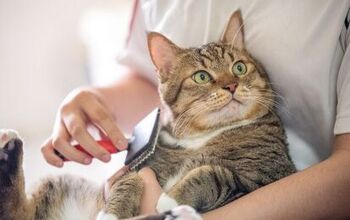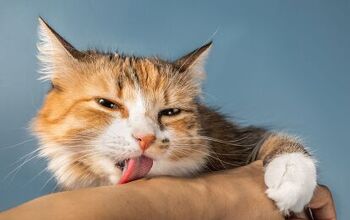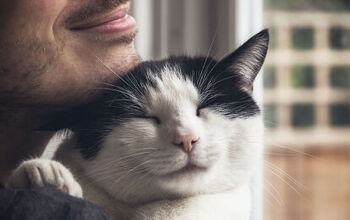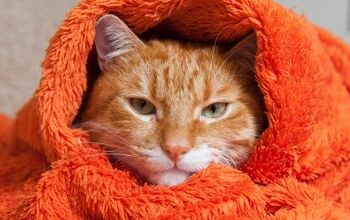Why is My Cat So Talkative?

Do you have a cat that is constantly vocalizing and making themselves known around your house? Whether it is a sweet, melodic purr, a high-pitched chirp, or a loud and obnoxious meow, there is no denying that our cats have a language all their own. The only challenge? Unless you know how to “talk cat,” you’re always just outside the conversation… What exactly are they trying to say?
In this post, we will take a deep dive into the world of cat communication, including understanding why your cat is so chatty, what subtle nuances you should pay attention to, and how your cat’s talkative personality can strengthen your bond.
Let’s get started…
4 Possible Explanations for a Talkative Cat
Just like humans, your cat may be trying to have a conversation for many reasons. Think about how many times you talk or vocalize throughout the day – you may ask for attention from a family member, share your thoughts about a given situation, or use your words to ask for something you want. The same can be said for your cat.
While it can be challenging to identify exactly what your cat is trying to say in some situations, it starts with understanding the most common reasons for a cat's vocalizing.
They Are Asking for Something Specific
Pay attention to where your cat is when making noise and what they may be staring at or pacing around. We can often identify what our cat is asking based on their behavior. A hungry cat may be very vocal while looking at an empty food dish until someone acknowledges their request and fills the bowl.
Some of the more common requests and the body language that accompanies their vocalizations include:
- Food and Water Refills: They may be nosing at the dish, pawing at it, or pacing around where they are regularly fed.
- Asking for Treats: We keep our treats on a specific shelf in the kitchen, and the cats can usually be found staring up in that direction when they are asking for something special.
- Play Time: Our girl Pippen can often be seen walking around with a toy in her mouth while making noises to get us to take it and play fetch with her.
- Wanting to Go Outside: Our cats are harness-trained, and their leashes and harnesses hang near the front door. They meow while pawing at the hanging leash when they want to go outside.
If you hear your cat meowing or chirping, follow the noise. Find out where they are and what they are doing, allowing the clues to help you better understand what they are trying to tell you.
They Are Seeking Attention
Does it appear that your cat is meowing relentlessly with no rhyme or reason for their actions? Do you have a cat that just walks around the house, meowing at various times throughout the day? There is a good possibility that your cat is simply trying to demand your attention.
Some cats are far more social than others and need to spend quality time with you or the other pets in your home. Think of it like an introverted person versus an extroverted person. While the introverted person may be happy hanging out at home without talking to anyone for a while, the extroverted person will start to go crazy needing social interactions. We often see Jinx doing this, specifically focusing on the loft area of the home that is only accessible to our cats, making it clear that she isn’t even calling us – she’s calling for the attention of our other cat.
They May Be in Heat
Do you have an unaltered female cat? One of the signs that your cat is going into heat is that they will begin to make a loud, yowling sound. This is an effort to call out to a potential mate. If you suspect that your cat may be in heat, keep them safely contained indoors, away from any unaltered males, to avoid an unwanted litter.
They Are Sick or in Pain
One of the most important reasons we need to pay careful attention to a cat that talks a lot, especially if it’s uncharacteristic, is that it could be a sign that something is wrong. It would be fantastic if our cats could just tell us that they aren’t feeling well and why – I am sure that veterinarians everywhere would love how much easier that could make a diagnosis. But the hard truth is that they can’t. In fact, it’s quite the opposite; cats are generally masters of hiding pain and knowing that, you can rest assured that a cat who is vocal due to illness or pain REALLY isn’t feeling well!
The biggest giveaway that your cat is “under the weather” is the type of vocalization that they are making. While other reasons for being chatty may involve meowing, chirping, or purring, the noises associated with pain are usually yowling or crying.
Some conditions that are more often associated with an increase in vocalization include:
- Arthritis
- High Blood Pressure
- Severe Injury
- Hyperthyroidism
- Dental Pain or Disease
Another condition that, while not associated with pain, could lead to more chatter from your cat is hearing loss. As your cat’s hearing diminishes, they may meow more often and louder than before simply because they can’t hear themselves unless they take the volume up a level.
Finally, this could be a sign of Feline Dementia. Cats suffering from this level of cognitive dysfunction are often confused and disoriented. They could be vocalizing in an attempt to express their confusion or ask for help figuring out where they are or what they are expected to be doing. Signs that could accompany this include accidents outside the litterbox from a cat that has always been litter trained, changes in sleep cycles, getting “stuck” behind furniture or other objects that have always been in that exact location in your home, or pacing around the house as if they are lost.
If you suspect your cat may be trying to tell you they aren’t feeling well, make an appointment with your veterinarian. They can run the tests necessary to pinpoint the exact cause of your cat’s discomfort. The quicker you identify the reason, the sooner you can offer much-needed relief, so don’t wait and hope that things will get better.
What Breed of Cat is the Most Talkative?
While nearly every cat will use its ability to talk and communicate at one time or another, some cats are naturally more talkative than others. If you have more than one cat in your home, you may have noticed that one is chattier than the other – I know we have!
Our older cat, Pippen, has the cutest little meow. It’s so soft and sweet and never fails to make you smile. Our younger cat, Jinx, on the other hand, is VERY vocal when she wants something. She will meow so loud and obnoxiously that you can’t help but hear her in every corner of the house. There are times that she is so demanding she just paces through the house, screaming out as loud as she can while she does.
This difference could come down to individual personalities, but it may also reflect your cat’s breed. Some cat breeds are known to be more naturally vocal than others.
Some of the cat breeds that are known for having the greatest “gift of gab” include:
- Siamese
- Turkish Angora
- Turkish Van
- Tonkinese
- American Bobtail
- Burmese
- Bengal
- Ocicat
- Maine Coon
Of course, just as there are breeds known for being more talkative, there are cat breeds well known for being quiet and calm. If you’re looking to introduce a naturally quiet cat into your home, here are a few breeds you may want to consider:
- Cornish Rex
- Russian Blue
- La Perm
- Munchkin
- Scottish Fold
- Havana Brown
- Abyssinian
- Ragdoll
- Persian
- Norwegian Forest Cat
Of course, you should never rely 110% on a specific breed characteristic coming true. For example, while most Russian Blue cats are quiet, a good friend of mine had a Russian Blue that was not afraid to make herself known throughout the day. She didn’t have the loudest meow by any means, but that didn’t stop her from sharing all of her thoughts.
How Do You Calm a Talkative Cat?
Now that we’ve talked about the possible reasons why your cat may be chatty, from the risk of illness to the fact that some talkative cat breeds just like to make themselves known, you may be wondering if there is a way to calm your chatty cat down. This is especially true for those who share their home with a cat that is often chatty at night as they are trying to sleep.
The solution to calming your cat will depend mainly on the cause of their talkative behavior. For example, a cat that is yowling due to being in heat can be calmed down by having your cat spayed. But it’s not always that black and white. Instead, you may need to try a few options until you find one that works for your cat specifically.
Here are a few tips for calming a talkative cat:
Give Them Your Attention
Take a moment out of your day, if your schedule allows, and give your cat some love and attention. If your cat is being talkative because they are lonely and seeking attention, simply spending time with you is the perfect solution! This could include snuggling, petting, giving them belly rubs (if they like them), or playing with their favorite toy. This is an excellent opportunity to focus on strengthening your bond.
Try Giving Them What They Are Asking For
This is a double-edged sword. Giving your cat what they are asking for will likely stop the chatter at that moment, but it could set you up for more requests of this nature in the future. By giving your cat what they want, you have taught them that asking in that way works.
Avoid Giving Them Attention
On the other hand, if you want to avoid this becoming a habit, you can avoid giving your cat any attention when they are meowing. This will require you to stick it out first, listening to your cat meow for a while before they finally give up. But for those who don’t want their cat using chatter to ask for something, this can train them to realize that being vocal won’t result in them getting what they want.
Reward Quiet
If you are focusing on ending this behavior, there is another step that will help to reinforce your desires. In addition to ignoring your cat when they are demanding your attention, try rewarding them for the times when they are quiet. To do this, wait until your cat stops meowing, acknowledge the behavior by marking it (with a clicker or saying “Yes!”) and reward them. In time, your cat will recognize that meowing to demand your attention doesn’t work, but being quiet will earn them a reward.
Offer More Enrichment Opportunities
Some cats will be super talkative and demand attention because they are bored. You can help relieve this boredom now and moving forward by adding more enrichment opportunities to your home. This could include new cat shelves and furniture for your cat to explore or interactive toys to keep them busy. Some cat parents also have luck playing cat-focused movies on the television or computer, like videos of birds or squirrels.
Another way to improve mental enrichment for your cat, reducing boredom, is to try training. As I previously mentioned, clicker training is a way to communicate what you want while introducing training commands. This can be used to teach your cat much like a dog, including basic obedience commands (sit, lie down, shake), agility training (running an obstacle course you have set up), and more. If you have an overly active and energetic cat, this is a great way to focus that energy on something positive.
To get started with clicker training, consider using a starter kit like the Cat School Clicker Training Kit for Cats. The instructions included with this kit really helped us adopt this style of training with our cats.
Final Thoughts: Why is My Cat So Talkative?
If you have an overly talkative cat, take a moment to reflect on their behavior in the past. Have they always been chatty? Some cats are naturally more vocal than others, using their voices to express their thoughts, feelings, opinions, and desires throughout the day.
However, if this is a new behavior, it could be a sign that something is wrong. Contact your veterinarian to share your concerns and make an appointment to rule out any medical causes.
Ultimately, your cat uses their voice to try to communicate with you – even if you can’t understand what they are saying. It is our responsibility to pick up on other clues, like body language, to decipher what they are trying to tell us. If you prefer they communicate differently, you can train them to better understand the communication styles that you prefer.

Britt Kascjak is a proud pet mom, sharing her heart (and her home) with her “pack” which includes her husband John, their 2 dogs – Indiana and Lucifer – and their 2 cats – Pippen and Jinx. She has been active in the animal rescue community for over 15 years, volunteering, fostering and advocating for organizations across Canada and the US. In her free time, she enjoys traveling around the country camping, hiking, and canoeing with her pets.
More by Britt



